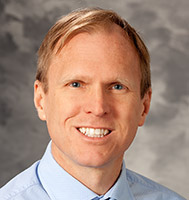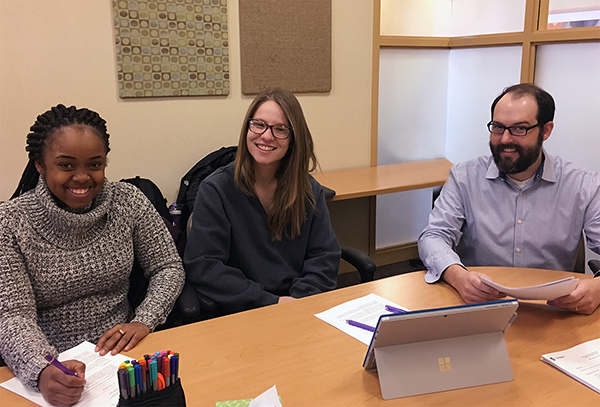
Mark Beamsley, MD, MS, is the integrated block leader for Chronic and Preventive Care, a new Phase 2 course in the SMPH ForWard Curriculum. DFMCH faculty, staff and colleagues were instrumental in rolling out the course, which blends clinical training in chronic disease management and community health experiences.
In January 2018, the University of Wisconsin School of Medicine and Public Health (UW SMPH) rolled out “Chronic and Preventive Care (CPC),” one of four Phase 2 courses in its new ForWard curriculum.
Led by integrated block leader Mark Beamsley, MD, MS, a UW Department of Family Medicine and Community Health (DFMCH) clinical associate professor, with support from numerous faculty and staff colleagues, the 12-week course blends clinical training in chronic disease management and community health immersion experiences.
A Focus on Outpatient Care
Students focus on three main activities throughout the course:
- Outpatient clinical experiences in family medicine, general internal medicine, psychology, neurology and other medical subspecialties (seven to eight half-days per week);
- Case-based, small-group learning sessions with other CPC students (one half-day per week); and
- Community health engagement and health advocacy projects in partnership with the statewide Area Health Education Centers system (one half-day per week).
In many ways, the CPC course is similar to the Primary Care Clerkship (PCC) that was offered in the third year of the traditional medical school curriculum. (The PCC formally ends on April 30, 2018.)
The biggest difference is that the new course integrates medical specialties to highlight common themes and system-level approaches to chronic disease management. Student rotations are now also coordinated systematically across all participating clinics, instead of with individual faculty.

Above, second-year SMPH students India Anderson-Carter and Bailee Stark with James Bigham, MD, MPH, at a small-group learning session at the Odana Atrium clinic.
In addition, student community health engagement is based on a team-based, longitudinal model, instead of individual student projects during one block of the PCC.
And because Phase 2 of the new SMPH curriculum starts halfway through the second year, students get this exposure earlier than before.
The CPC course is also the only Phase 2 course that’s entirely outpatient based, giving students a unique opportunity to learn how different clinicians, health systems and communities work together to promote health.
“Outpatient care is the cornerstone for patients and health systems,” reflects Dr. Beamsley. “This course is challenging for students because the scope of chronic medical conditions is wide and human experiences with illness vary. One of the key reasons it is rewarding, however, is that students learn essential skills from family physicians to help patients, no matter what their situation is.”
A Positive, Rewarding Learning Experience
The first cohort of students to have completed the course shared positive feedback about both the course structure and the faculty with whom they worked.
“The preceptors I was assigned to were incredibly helpful and taught me a lot about primary care and outpatient medicine,” notes one. “I really enjoyed both the community health project and the advocacy project. I think both are important as future physicians.”
“I loved being at a different clinic every day and having long-term relationships built at each clinic,” reflects another. “Being able to be with the same physician over the entire block really maximized my learning experiences as they had more trust in me and would let me fully participate in patient care.”
And although rolling out a new course is a substantial organizational effort for faculty and staff, Dr. Beamsley is grateful to everyone at the DFMCH and beyond for making it go as smoothly as possible.
“I want to thank all of the faculty and staff who participated in this transformation for their engagement, flexibility and resiliency,” he says. “Your dedication is what makes it possible for students to have such a positive, rewarding learning experience.”
Published: April 2018
